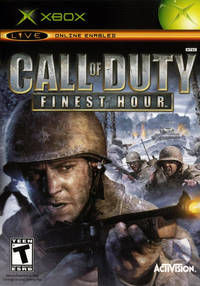Call of Duty - Finest Hour
| Home > Browse Our Collection > Software > XBOX > Call of Duty - Finest Hour |
|
Call of Duty: Finest Hour is a 2004 first-person shooter video game. It was released for the GameCube,PlayStation 2, and Xbox on November 16, 2004 in North America. It was the first console installment of Call of Duty, developed by Spark Unlimited and published by Activision. It was followed up by a sequel, Call of Duty 2: Big Red One, in 2005. Although it is based on the original Call of Duty franchise for the PC, it has a completely different storyline and acts as a side-story/expansion of the main game. In the spirit of previous Call of Duty games, it features numerous intertwined stories and battles based on real events from the perspective of six soldiers on each side of the Allied campaign (U.S., British, and Soviet). Finest Hour can support both online and local multi-player support, depending on the console. It has no online multi-player support for the GameCube as it does not take advantage of the GameCube broadband or modem adapter. On the Xbox, Finest Hour has online multi-player support and up to 32 players can play locally though Xbox's System Link feature. The PlayStation 2 port of Finest Hour also has online multi-player support, with up to 16 players per session. Finest Hour received mixed to positive reviews. IGN states that despite its portrayal of a good shooter, it is still stuck between realism and over-the-top antics. The graphics have been criticized as being very ordinary along with the effects being disappointing. The sound was also found to be out of sync in some areas of the game. Finest Hour is considered to have fallen short of the high benchmark set by its PC counterpart. The game's music was composed by Michael Giacchino, who previously worked on the original Call of Duty and the Medal of Honor franchise. AC/DC singer Brian Johnson provides the voice of Sergeant Starkey, one of the British commandos.
Other Software by Activision:
Information About Activision:
This exhibit has a reference ID of CH9947. Please quote this reference ID in any communication with the Centre for Computing History. |
 Click on the Images
Click on the ImagesFor Detail
|









